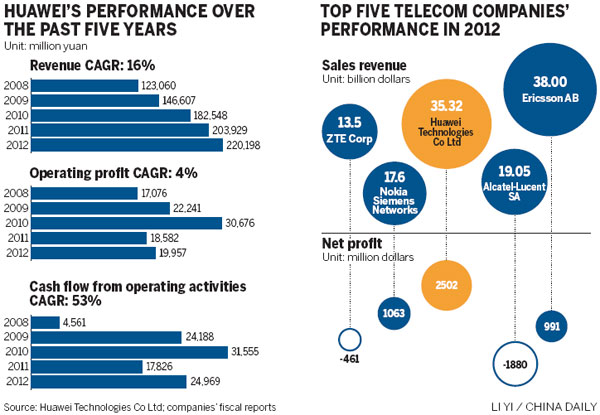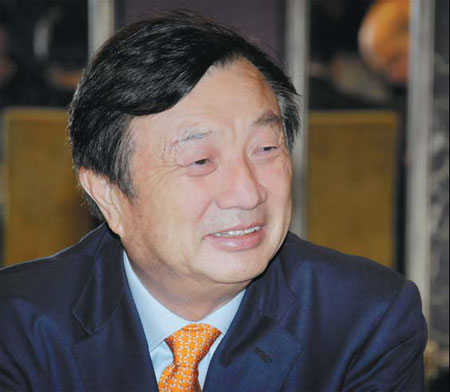Mystery man opens up ... a little
Updated: 2013-05-17 08:40
By Shen Jingting (China Daily)
|
|||||||||||
|
Huawei's founder Ren Zhengfei is known as a man who avoids media exposure, but he is showing signs of opening up, having given a news briefing to four New Zealand media representatives in Wellington in early May. Provided to China Daily |
Huawei founder makes interesting revelations to new zealand media in rare interview
People are usually impressed when they first see Huawei Technologies Co Ltd's headquarters in Longgang district, Shenzhen, near Hong Kong.
Huawei, which manufactures telecoms equipment, has an attractive base, more like a college campus, with a diversity of sections, cafeterias and traditional Chinese-style architecture.
Built beside a lake are several villas that are the offices for Huawei's core management team, including its founder and chief executive officer Ren Zhengfei.
Ren has long been regarded as a "mysterious and tough" man. He rarely appears in public or talks to the media but he led Huawei from nothing to the world's second-largest telecom equipment maker by revenue, only behind Sweden's Ericsson AB.
To the surprise of visitors, Ren revealed a gentle side in developing Huawei's headquarters. A member of his staff, who declined to be named, said Ren loves vegetation so he bought and arranged the planting of many expensive trees to decorate Huawei's garden.
Just as Apple Inc's Steve Jobs imposed his tastes on Apple's retail stores with their glass staircases, Ren employed his design preferences.
Huawei College is a building where the company trains employees. Under its tall glass roof hang dozens of irregularly shaped yellow shades. They add a modern flavor to the internal space but also protect people from the strong sunshine while maintaining enough light under which the indoor plants can grow.
Ren is not short in the romantic department. There is an old-fashioned wooden train on a lawn at Huawei's HQ. To be precise it is an elegantly decorated restaurant. Ren likes to entertain guests there.
Anyone who enters Huawei's HQ enjoys a relaxing atmosphere, much as one would experience when visiting an Internet company in Silicon Valley. It's a multi-racial community with some employees from partner companies in African countries for whom Huawei provides training.
In recent years Huawei has started to change its method of communicating. At one time it was labeled as a "closed and dangerous" company by Western media. Now it is making a huge effort to change its image on the world stage by inviting reporters to visit its headquarters, disclosing financial figures and arranging high-level management interviews.
Ren, 69, had never previously spoken to any media on the record but he gave his first-ever news briefing to four New Zealand media representatives in Wellington in early May.
It came after New Zealand's biggest telephone company, Telecom Corp, awarded Huawei a contract to build its new nationwide wireless network. Huawei was also chosen as a core supplier in 2011/2012 for New Zealand's ultra-fast broadband initiative.
"New Zealand is one of Huawei's most important strategic markets and is very valuable to us," said Ren in a statement.
Huawei entered New Zealand in 2005 and now employs 120 people there.
Ada Qin, a senior editor at Forbes China, said when Huawei encountered severe opposition after bidding for contracts in the United States and in Australia, New Zealand's support meant a lot to the company.
In 2012, Australia cited national interest concerns when it banned a Huawei unit from tendering for contracts linked to the nation's 36 billion Australian dollar ($38 billion) broadband network.
"The South Pacific region contributes a small share of sales to Huawei but it is critical in Huawei's fight against US opposition," Qin wrote in a Chinese analysis article.
According to Huawei's 2012 annual financial report, the Chinese and European markets accounted for about two-thirds of Huawei's total revenues. Huawei has developed a relatively stable cooperation with these markets.
However, US influence is powerful and imposes pressure on other countries. "The Australian market is important to Huawei's global ambitions. If Huawei gives up there, it may be a very damaging situation for the company."
Ren frequently turns down interview requests, both at home and abroad. His low-profile approach makes many suspicious of him and his company. Given his Chinese military background, US politicians, among others, often cite Huawei as a possible threat to national security.
In 2010, the then US commerce secretary Gary Locke warned Sprint Nextel Corp against awarding Huawei part of a contract worth billions of dollars. Locke called Sprint CEO Dan Hesse directly to remind him of the US government's security concerns, according to a report in The Wall Street Journal.
The latest obstacles faced by Huawei include a US congressional report last year that said Huawei and ZTE Corp, another Chinese telecom infrastructure provider, posed a threat to the country, citing concerns that their equipment might be used to spy on the US. Both companies strongly denied the allegations.
In Europe, meanwhile, the European Commission has been considering whether to start an investigation into alleged unfair trade practices by Chinese companies including Huawei. Because of this, Huawei has been barred from doing business with major US telecom carriers.
As a result of these setbacks Ren appears to have realized Huawei has to be more open to win trust and erase any misunderstandings.
In internal conversations, Ren is reported to have said he was not used to talking to journalists but he encouraged his management team to attend interviews. The New Zealand media response, however, was an indication that he was prepared to make more of a personal effort.
Ren does not avoid sensitive issues. When local reporters asked about the US accusations, Ren said: "Huawei equipment is almost non-existent in networks currently running in the US. We have never sold any key equipment to major US carriers, nor have we sold any equipment to any US government agency. Huawei has no connection with any cyber security issues the US has conceived of, whether they are in the past, the current or the future."
Scott Sykes, a Huawei spokesman, told The Wall Street Journal: "Mr Ren is starting to feel more comfortable about speaking with the media. This is a major step for us."
Ren founded Huawei in 1987, when he was 44 years old. Before that, he had launched businesses over three years but none were successful. Ren did not give up but established Huawei with a registered capital of 200,000 yuan ($32,540; 25,280 euros). Initially Huawei just traded telecom equipment.
The first of China's iconic entrepreneurs was born in the 1980s, when the country underwent reform and opening-up. Among Ren's peers are Liu Chuanzhi, the founder of Lenovo Group, and Zhang Ruimin, who built Haier Group, the home appliance empire.
Addressing questions about his experience as an engineer in the People's Liberation Army, years before he founded Huawei, Ren was quoted by a newspaper in Fairfax, New Zealand, as saying: "Back in 1978 it was not yet the time for China to open itself up to the outside world. At that time my personal belief was to work hard, dedicate myself or even sacrifice myself for the benefit of the people. Joining the Communist Party was in line with that aspiration."
After 24 years, when Huawei had grown into a telecom equipment giant that is now a threat to most of its rivals, Ken Hu, its deputy chairman, said in a public defense of Ren's background that many CEOs in big US companies are Democrats or Republicans and some of them, just like Ren, had served in the military. Nearly one-third of US CEOs in global Fortune 500 companies are graduates of the United States Military Academy at West Point, according to public records.
Ren is said to be a workaholic. His cellphone is turned on almost 24 hours a day, according to the book Will Huawei Fall Next? Ren takes more than 100 flights every year and he has no hobbies apart from reading.
Ren's work ethic has paid off. In 2012, Huawei secured its position as the world's second-largest telecom equipment vendor and delivered the best financial figures among the top five players.
Huawei is not far behind the No 1 vendor Ericsson. Its revenue rose 8 percent to 220 billion yuan last year. Net profit increased to 15.38 billion yuan during the period, up from 11.65 billion yuan a year earlier. Ericsson booked about $38 billion in revenue in 2012.
Huawei's rise accompanied the fall of other great companies. The stock price of Lucent Technologies Inc peaked at $84 a share in 1999 but quickly fell to a few dozen cents a share in 2002.
Lucent, which owns Bell Laboratories, was once regarded as a company with the most powerful telecom technologies. It merged with French-based Alcatel in 2007.
The major reasons behind Huawei's success are said to be its customer orientation and its continuous self-criticism. Ren once said, Huawei should treat customers with a religious passion. "Serving clients is the only reason why Huawei exists," Ren wrote in an article.
At an internal conference in March, Ren reiterated that Huawei, a privately held company, would not seek a public listing for at least a decade. Previously, Ren explained to AEA Investors chairman Vincent Mai and US business leaders at a New York lunch that technology companies such as his were driven by talented people. If Huawei lists too early it will create many millionaires which would damage people's passion for work, he said.
Ren also said there are four family members working at Huawei but they will not be his successors. It requires many capabilities such as vision to become Huawei's leader but they lack this requirement, Ren said.
When he attempted to dismiss the air of mystery, Ren even talked about his retirement. He said he would open a bottle of champagne at that time. "Maybe I will open a cafe or a restaurant and have a farm," he was quoted. He didn't disclose a specific date but said it depends whether Huawei still needs him.
shenjingting@chinadaily.com.cn

(China Daily 05/17/2013 page20)
Today's Top News
List of approved GM food clarified
ID checks for express deliveries in Guangdong
Govt to expand elderly care
University asks freshmen to sign suicide disclaimer
Tibet gears up for new climbing season
Media asked to promote Sino-Indian ties
Shots fired at Washington Navy Yard
Minimum growth rate set at 7%
Hot Topics
Lunar probe , China growth forecasts, Emission rules get tougher, China seen through 'colored lens', International board,
Editor's Picks

|

|

|

|

|

|






